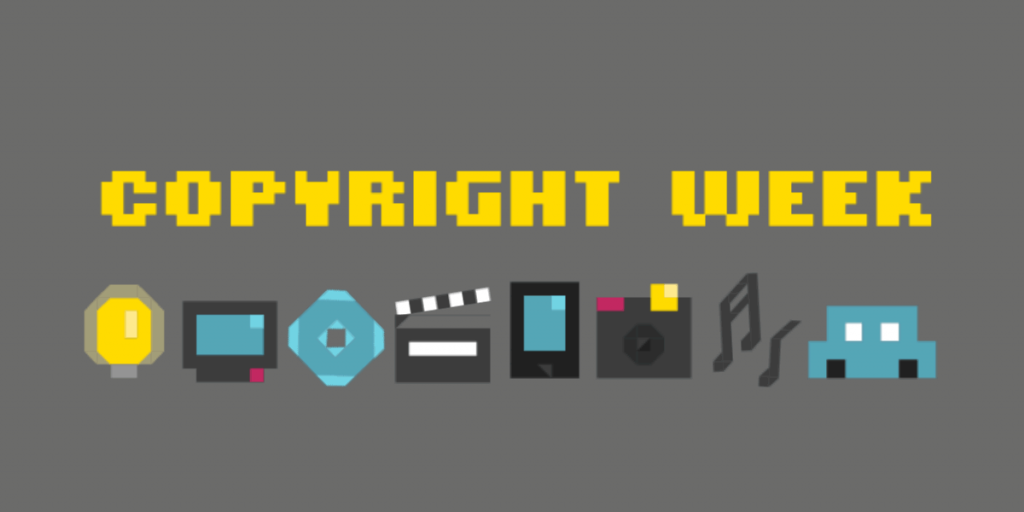We Bought It, We Own It, We Fix It: Building Open Policies for Digital Public Goods
Copyright
We’re taking part in Copyright Week, a series of actions and discussions supporting key principles that should guide copyright policy. Every day this week, various groups are taking on different elements of the law, and addressing what’s at stake, and what we need to do to make sure that copyright promotes creativity and innovation.
Today’s topic for Copyright Week is “You Bought It, You Own It, You Fix It”, which means that copyright law shouldn’t interfere with your freedom to own your stuff however you see fit: to repair it, tinker with it, recycle it, use it on any device, lend it, and then give it away (or re-sell it) when you’re done.
Many rights holders are saddling their content with digital rights management (DRM) or restrictive licensing agreements that attempt to limit the use, modification, and distribution of copyright-protected works. In some instances, copyright law being misused in service of controlling access and use of legally-acquired content.
One recent example concerns the agricultural machinery manufacturer John Deere. John Deere attempted to use U.S. copyright law to restrict access to the software code on their tractors. Specifically, the company contended that provisions of the Digital Millennium Copyright Act allows them to limit farmers’ ability to inspect and modify software code to fix or enhance the equipment they already own.
Every three years the Library of Congress entertains arguments from stakeholders wishing to receive an exemption from the anti-circumvention rules of the DMCA. If the exemption is granted, the farmer would be able to legally (within their technical limitations,) bypass the DRM in order to examine and fix their equipment. However, the Library of Congress process is far from ideal. The list of categories of exemptions is quite limited, and requires interested parties to submit new evidence every three years in order to be granted a renewal.
But the principle behind “You Bought It, You Own It, You Fix It” extends beyond our ability to repair, tinker, and fix the technologies to which we have legal access. We see a parallel in the policy work and advocacy that publicly funded resources should be openly licensed resources. Just as we need rules that protect people in accessing and using content and technologies they’ve already paid for (like a John Deere tractor), we need public policies that guarantee access and re-use rights to things we pay for together, like scientific and medical research, educational resources, job training materials, and public sector data.
There are multiple benefits to the public of requiring open licenses on publicly funded resources. For example, it enables collaboration between researchers because the materials are legally “open” for working together, and for continuous improvement. It makes access easier and cheaper over time because the materials are shared widely instead of being locked down under copyright and proprietary licenses that benefit only a small number of rights holders. It increases the efficiency and overall impact of the grant funds stewarded by government agencies.
There are already implementations of the principle that publicly funded materials should be openly licensed materials. One specific example is a grant program at the U.S. Department of Labor. It’s a big program funding up to $2 billion for the creation and dissemination of education and training materials. The difference between this grant program and those that have come before it is that grantees must agree to license and publish the digital content they create under a Creative Commons Attribution (CC BY) license (Note, the open licensing policy has been extended to apply department-wide). This way, the public, and anyone around the world, are free to re-use the materials for any purpose, as long as they give credit to the author of the materials.
Outside of government, we know that philanthropic foundations are learning toward adopting similar policies for their grantmaking. For example, the Bill & Melinda Gates Foundation adopted a liberal open licensing policy (which went into effect as of January 1, 2017) for its science funding programs whereby all peer-reviewed published research and underlying data sets must be published immediately (meaning: without embargo) under a CC BY license.
Tomorrow for Copyright Week: “Transparency and Representation”. Copyright policy must be set through a participatory, democratic, and transparent process. It should not be decided through backroom deals, secret international agreements, or unilateral attempts to apply national laws extraterritorially.
Posted 17 January 2017